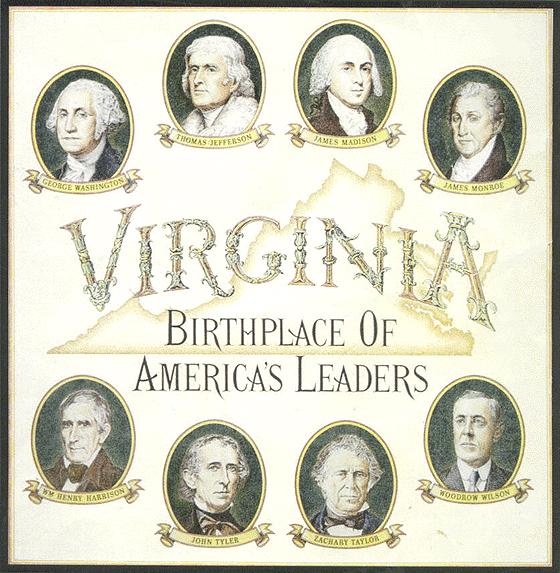On the trail of the lonesome pine;
In the pale moonshine
Our hearts entwine
Where she carved her name and I carved mine..."
- 'On the Trail of the Lonesome Pine',
Laurel & Hardy
The trail of the lonesome pine has led us down from Vermont to Virginia. With the possible exception of Massachusetts no state was more important to the early history of the United States.
Virginia is, after all, where the English first staked their claim to a piece of the New World. Spain was busy down in South America, Mexico and Florida, Portugal had claimed Brazil, France was working its way down the St Lawrence and up the Mississippi. That left the eastern seaboard of what is now the USA to the English. It was here that Sir Walter Raleigh first ate potato and smoked tobacco (thank heavens he didn't get them the wrong way round!). The James Town settlement was founded here, plantation culture took off here, and many of the leaders of the early United States hailed from Virginia - George Washington, Thomas Jefferson, James Madison and James Monroe. In all, from 1789 to 1825 there were only four years when the presidency was not held by a Virginian plantation owner. No wonder the new capital of Washington D.C. was founded so close by.
Those plantations required workers, however: slaves. The uncomfortable truth is that Monroe, Madison, Washington and Jefferson (he who wrote that "We hold these truths to be self-evident, that all men are created equal...") were all slave-owners. Other Virginia-born presidents such as William Henry Harrison (1840-41), John Tyler (1841-45) and Zachary Taylor (1849-50) were all from slave-owning families - Taylor was the last president to personally own slaves during his term in office. The persistence of slavery meant that during the Civil War Virginia found itself allying to the Confederacy. The Confederate capital was Richmond in Virginia. It also meant that Virginia was right on the front line. Savage battles were fought across its territory and the western hill country - what is now West Virginia - seceded.
Is it fair to say that since the Civil War Virginia has lost some of its elan? It is still a big and well-populated state. It is still home to the Pentagon in Arlington and the CIA in Langley. The Navy is concentrated around Norfolk and the Marine Corps is based in Quantico (as is the FBI Academy). It also provides homes for many of the people who serve or work in DC. Yet these days the nation's eyes turn to New York, California, Texas, Illinois, even Ohio before they turn to Virginia.
Which is a shame. I saw a bit of Virginia when I visited DC in 2010. On one day we toured out to see George Washington's estate at Mount Vernon. On another we hired a car and headed south-west to Charlottesville. Here, at Monticello, the estate of Thomas Jefferson, I was able to look out east from its ridge-top position. Rather than a dull land of suburbs and fields I could see a sea of trees rolling away to the horizon. Such a view, I thought, must have been enjoyed by Jefferson two hundred years before me... or the first English settlers two hundred years before that. Despite all the turmoil of the last four centuries I was happy to feel that in places Virginia still felt rather timeless.
So that's a whole lot of history to cram into just three films but I'll try my best. The films I have chosen are:
- Pocahontas (1995)
- The Howards of Virginia (1940)
- Remember the Titans (2000)

No comments:
Post a Comment